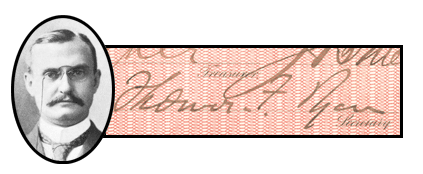Kentucky Mineral and Timber Co. $1,000 Uncanceled Gold Bond signed by Brayton Ives and Thomas Fortune Ryan
Inv# AG1025 Bond
New Jersey
$1,000 5% Gold First Mortgage Bond printed by Dennison & Brown Lith., N.Y. Thomas Fortune Ryan and Brayton Ives both sign.

Thomas Fortune Ryan (1851-1928) was born near Lovingston, Virginia. Ryan’s father was a tailor and manager of a small hotel. His mother died when he was 5. His father remarried and moved to Tennessee two years later. Ryan was reared by his mother’s extended family in Lovingston, who were Protestants.
In 1868, seeking his fortune outside the post-Civil War South, 17-year-old Ryan moved to Baltimore to seek his fortune. En route to Maryland, Ryan converted to Catholicism after long discussions with a fellow passenger on the train. In Baltimore, John S. Barry, a prosperous dry goods merchant, hired him. By 1872, Barry helped Ryan secure a brokerage assistant position on Wall Street. Ryan opened a brokerage firm, Lee, Ryan & Warren, with two partners the following year. In 1873 he married Barry’s daughter, Ida Mary Barry, whose family were devout Catholics. With her he had three children.
In 1874, his firm purchased Ryan a seat on the New York Stock Exchange, making him the youngest member in Exchange history. At the same time, Ryan became active in politics, especially the Tammany Hall machine that controlled much of the city's operations, which gave him political and industrial contacts across the city.
Ryan's fortune began in public transit. In 1883, he founded the New York Cable Railroad and bid on the proposed route from lower Manhattan to Midtown. After numerous legal and financial problems, in 1886 Ryan re-organized his cable railroad as the Metropolitan Traction Company. Metropolitan continually acquired additional lines so that by 1900 Ryan controlled most of New York’s streetcar operations.
Ryan’s most profitable investment was tobacco. Having invested in tobacco stocks throughout the 1890s, Ryan joined his assets forming The Union Tobacco Company. Shortly thereafter, Ryan merged his company with that of his greatest competitor, James Duke of North Carolina, forming the American Tobacco Company. Together Ryan and Duke developed the British-American Tobacco Company to protect American tobacco trade in Europe.
In 1905 Ryan purchased the Equitable Life Assurance Society, a major company in the insurance industry with $400 million in assets. Although Ryan strove to make Equitable more responsive to its policy holders, public reaction to his purchase of the company was overwhelmingly negative. His reputation for cutthroat business dealings in the streetcar and subway businesses made the public distrustful and, in 1909, he sold his Equitable stock.
Also in 1905, Ryan's Metropolitan street car system was threatened by a major competitive development, New York’s increasingly popular subway system. He merged his company with August Belmont’s Interborough Rapid Transit Company. But the joint company’s finances were shaky, and Ryan pulled out. Meanwhile, some $35 million that Ryan had raised in a bond issue were misappropriated. Ryan was investigated for corruption in 1908, but the grand jury brought no charges.
Meanwhile, Ryan was making fortunes with coal mines, banks, public utilities and railroads. At one time Ryan had controlling interest in 30 corporations.

A bond is a document of title for a loan. Bonds are issued, not only by businesses, but also by national, state or city governments, or other public bodies, or sometimes by individuals. Bonds are a loan to the company or other body. They are normally repayable within a stated period of time. Bonds earn interest at a fixed rate, which must usually be paid by the undertaking regardless of its financial results. A bondholder is a creditor of the undertaking.










Ebay ID: labarre_galleries